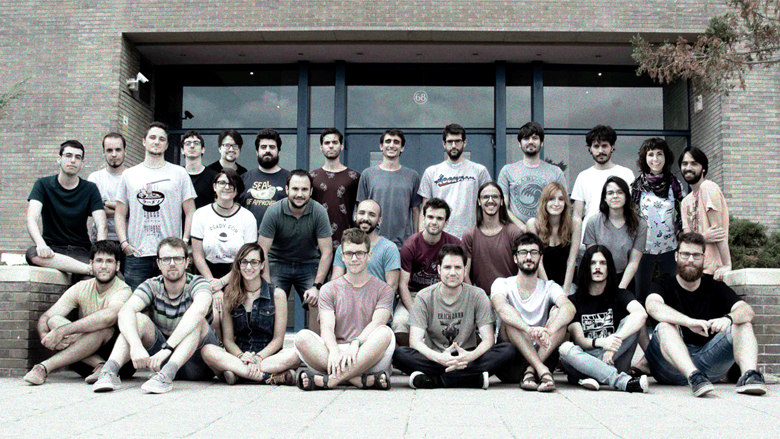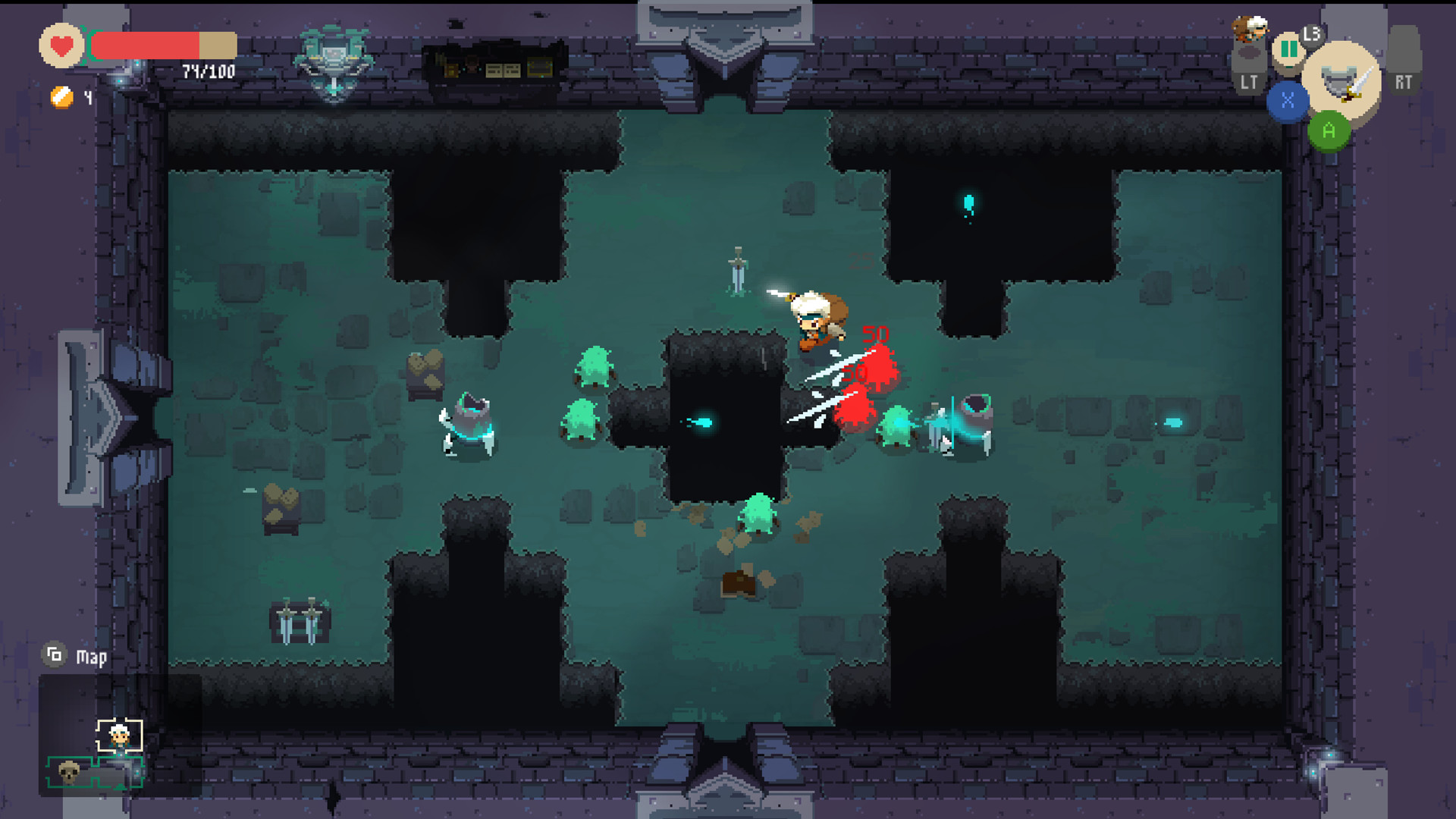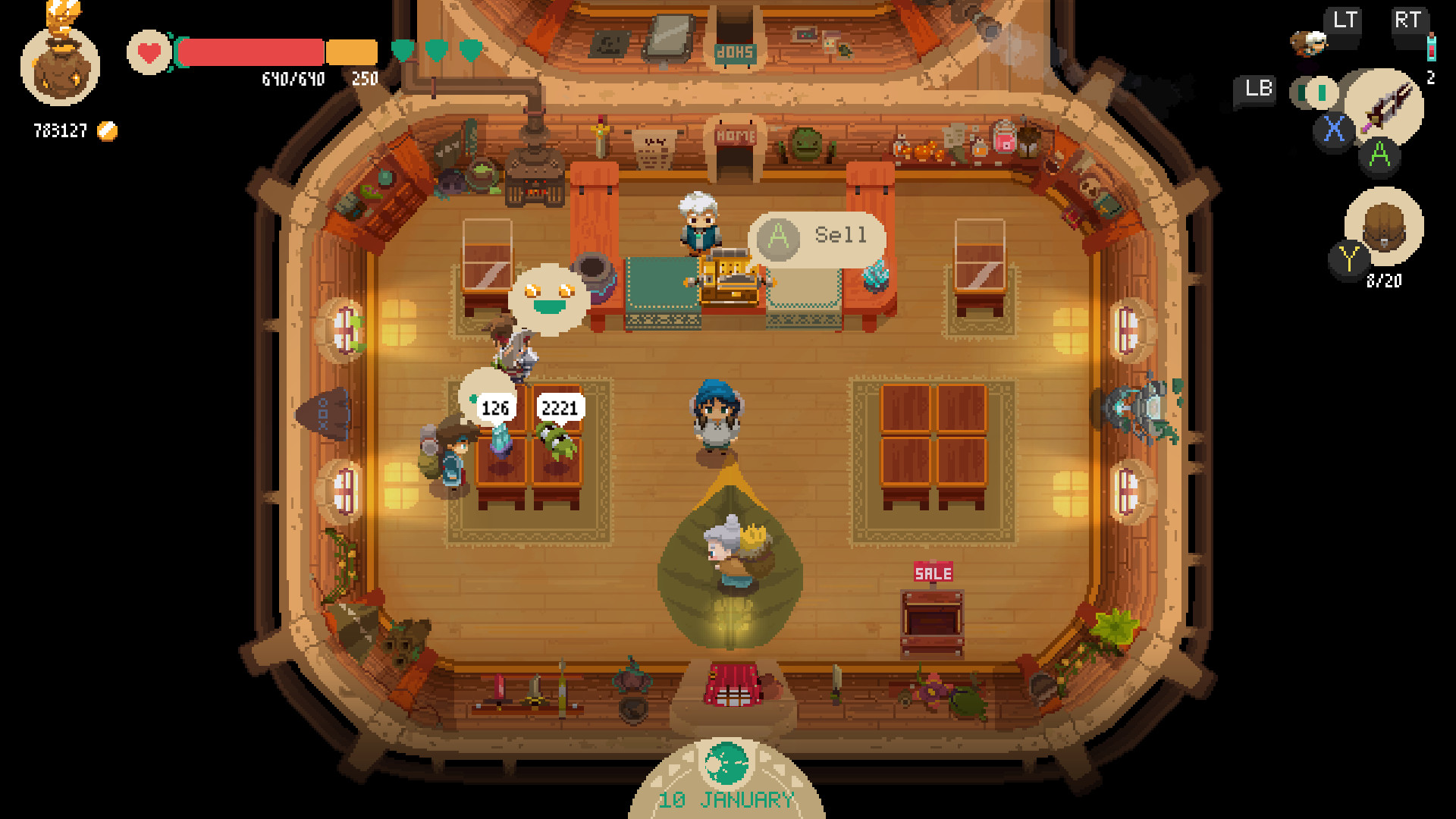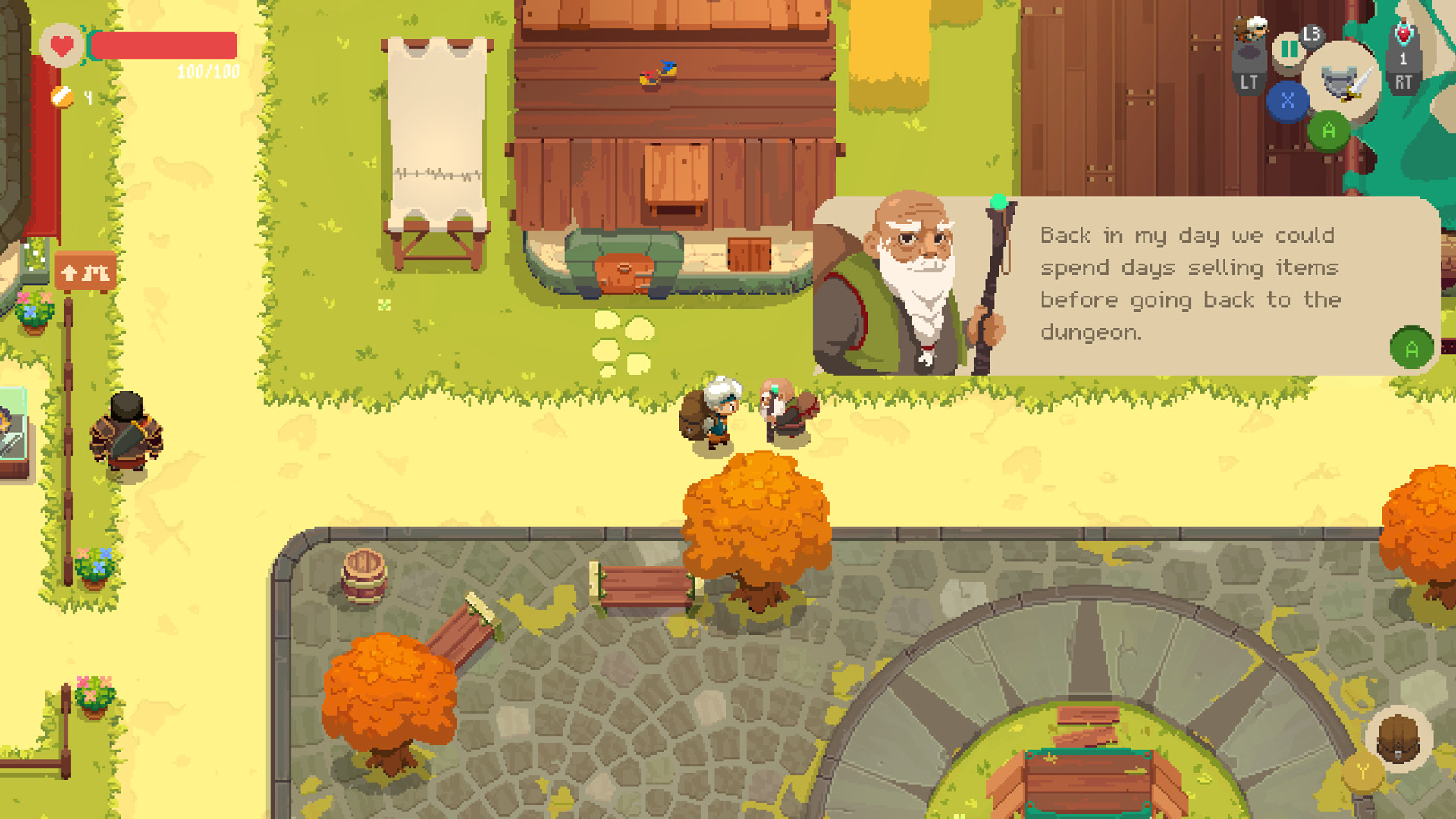Moonlighter, developed by Spanish studio Digital Sun, has become an indie hit on PC, PlayStation and Xbox, with over 500.000 installs and counting.
Moonlighter is an Action RPG that puts you in the shoes of Will, a shopkeeper by day and a dungeon explorer by night.
Gameworldobserver.com talked to Digital Sun CEO and founder, Javier Giménez, about the history of the studio, choices behind their degut game, and Moonlighter‘s successful release.

Javier Giménez
About the studio
GWO: How does a person start making games in Spain? Is there a big professional community?
Javier: There is some industry, but not as big as in Poland or France, for example. The last few years have been very good for the indie scene and we have had some successes like They Are Billions or Gris which might result in the consolidation of more, stronger, companies. We also have some larger veteran studios like Tequila or Mercury so, maybe, we’ll end up having a proper videogame industry in the short term.
GWO: Before Moonlighter, you did work for other studios. Could tell us about those projects?
Javier: The team has been around for 6 years. We started as an outsourcing company and did a lot of games for customers, it’s been great to grow the studio’s abilities and also, obviously, to fund Moonlighter.
GWO: Did this experience prepare you for Moonlighter? In what way?
Javier: Totally, we learnt how to build games, processes, developed our skills and professional mindset, etc… I would say that having been an outsourcing company makes us a better studio.

Digital Sun
GWO: How and why did you transition to working on your own IP? Any challenges you came across in the process?
Javier: Well, the process was slow. It had always been on our mind, since we loved the idea of working on our own games, but it has been very challenging. Organizing many projects at the same time, trying to maintain financial stability, etc.. – it’s been a constant struggle. Now, even though we are working on several internal games in parallel, things look simpler and more peaceful in comparison.
GWO: If you had to describe your game development philosophy, how would you put it?
Javier: Quality first. We love videogames, and we might be better or worse, but we’ll always try to create something worth playing, we’ll try to produce a game that we can be proud of.
GWO: Javier, your profile on the studio’s website says that your management style is based on avoiding the boredom of leadership. How does that work?
Javier: Hahaha! It’s just a joke. What I meant is that I love building games, participating in the creative process, and even coding. I love coding. But since I’m the director of the company, I have responsibilities in many other areas. I handle those gladly, but secretly, I envy the artists, programmers, and designers that work fully in the creative process.
GWO: And the main industry question of the last several weeks: Do you crunch at Digital Sun? On a related note, do you take a siesta?
Javier: We don’t crunch. We don’t like that approach, we’d rather take a little longer to produce a game but stay happy and focused on quality. We take it very seriously to maintain a good personal/work balance. It is true that sometimes we need to do extra hours here and there. When you create something as difficult to produce as games, you need extra effort in some situations, maybe for a couple of days (for example it happened to us when we were porting Moonlighter to consoles before the release) but it has always been very situational, with only a few people. It happens very rarely. At the same time I must say that I don’t judge other companies, they work on a different type of games, have different cultures, compensation models, etc. I think that judging everybody by the same standards without knowing their specific situations is usually a little unfair. And no, we don’t take siestas.
Making Moonlighter
GWO: How did you come up with the idea to combine rogue-like hack-and-slash action with the trade simulator and inventory management puzzle? Did the narrative come first (the duality of a shopkeeper who wants to be an adventurer) or the gameplay where you combine features from different genres?
Javier: In the case of Moonlighter, the concept of “what would it be like to play as the shopkeeper?” was where it all begun. And then we started adding elements of games we loved like The Binding of Isaac or Rogue Legacy.

GWO: Were you even sure these elements would be compatible at all?
Javier: No, we were not. But it turns out that one of the strongest points, in my opinion, of Moonlighter is the dual nature of the cycle. The fact that when you are in the dungeons, you have the shop in mind, and when your are trading in town, you have the dungeons in mind. They blend together quite well .
GWO: Why pixel art? There has been so much pixel art in recent years that people might have gotten tired of it. Were you concerned this might be the case?
Javier: Well, we love pixel art, and it felt a little easier to produce than other style when we started (and we had very humble beginnings!). It’s true that there is so much pixel art that it doesn’t make a difference anymore. We tried to produce the best pixel art we could and I think that we can be proud of the visuals of Moonlighter. I think that people like the art of Moonlighter because it’s beautiful, not because it’s pixel art.
GWO: You pitched the idea for Moonlighter on Square Enix Collective. Were there any surprises there? Did you change anything about the original concept based on the feedback?
Javier: Yes, we did, and we are grateful to the Square Enix Collective team, they were awesome. The main surprise was that Moonlighter had the higher positive vote percentage in the platform, it was a huge moral boost for the team and helped as a lot in the Kickstarter campaign that followed.
GWO: Could you tell us about your crowdfunding experience?
Javier: It was very positive. Again, Square Enix Collective helped a lot and, for us, it was very important both in terms of confidence in ourselves and financially (every euro helped a lot!).
GWO: What was your marketing strategy?
Javier: Well, that was something totally guided by our awesome publisher, 11 Bit studios, they had a lot more experience. Essentially we went to conferences and events to talk to press and influencers, and produced trailers and press releases to announce the important stuff. That’s basically it.
GWO: The soundtrack for Moonlighter is truly memorable. Now it was your turn to outsource the job to somebody. How did you work on the music for the game?
Javier: We worked with David Fenn, who we knew from his work in Titan Souls. We are indeed super happy with the result. He’s awesome, and was also super efficient, quick and professional. I hope we were also a nice studio to work with and that he’s happy with the results in the game.

After the release
GWO: Many big studios go for weekly updates to keep the game relevant and the players engaged. You have rolled out plenty of new content already. Are you planning to support Moonlighter in the future with lots of frequent updates, or will you slow down at some point?
Javier: We did 6 free updates of the game, and I’m afraid we won’t be doing any more. We also want to work on new projects! We have announced a paid DLC that will come out quite soon and after that we’ll probably focus on the next projects.
GWO: How do you work with feedback? No PR specialist on your team yet.
Javier: Our publisher 11 Bit helps a lot with customer support, which can get insane with so many players. We don’t have PR specialists but our producers (there is four of us on the team right now) handle community management. We are not a very big company so some of us have to wear a lot of hats! I wish we could answer to everybody but I’m afraid that’s just impossible so we try to do our best.
GWO: Your backers on Kickstarter keep demanding physical copies. Is there a problem?
Javier: Yes, there is, we had a problem with the provider we selected to produce the physical rewards of the Kickstarter campaign, they have some internal struggles apparently. It seems they have solved those and very soon we’ll be able to send the backers the physical rewards. We understand their frustration, it has also been frustrating for us.

GWO: Your game sold over 500.000 copies. That’s a very impressive result for an indie project. Did you count on that? Are you going to reinvest this money in the studio?
Javier: Well, it has sold over 500.000 so far across all platforms. It took 10 months to achieve this result. Anyway, it’s incredible. We would have considered a big success to sell 100.000 copies so the figures are something we didn’t expect even in our wildest dreams. We are going to reinvest the money in the studio, but also in the team, which when you think about it, it’s pretty much the same thing!
GWO: You are hiring new talent, according to your website. How big do you want to make your studio? What kind of specialists do you need?
Javier: We are hiring some people yes, specially 3D artist and a couple of developers, but we don’t have plans to grow big. We plan on being somewhere between 30 and 40 people, and stay there. Something that allows us to produce the kind of games we want to produce while keeping a team on which everybody knows everybody. We want to be a great place to go to work everyday and I think we are getting closer and closer to that.
GWO: What’s next for Digital Sun?
Javier: Well, more games! We are all huge game fans so our ambition is simply to make the best games we possibly can, make a living on it and have fun in the process. We define ourselves as a multigame studio so, you can expect as to produce a couple of games in the following years. Maybe they will be horrible, maybe not, we’ll see!
GWO: Goold luck with these projects and thank you for the interview!
